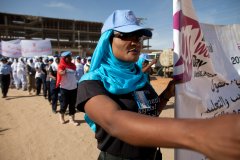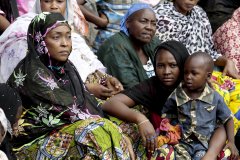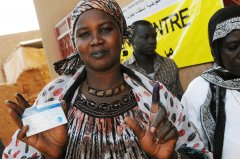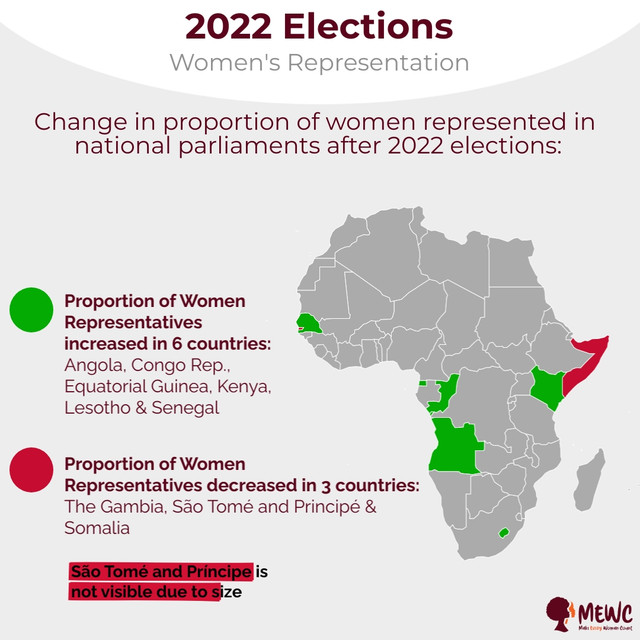Gender Issues Showlist
Women, Peace & Security
UNSCR 1325 calls on all parties to: protect and respect the rights of women and girls in conflict & post-conflict; increase women participation in all conflict resolution, peacekeeping and peace-building & to end impunity by prosecuting perpetrators of sexual and other violence on women and girls
index.php?option=com_content&view=category&id=56&Itemid=1913
Human Rights of Women
Thirty six years after the adoption of CEDAW, many women and girls still do not have equal opportunities to realize rights recognized by law. Women are denied the right to own property or inherit land. They face social exclusion, “honor killings”, FGM, trafficking, restricted mobility, early marriage,...
index.php?option=com_content&view=category&id=44&Itemid=1908
Violence Against Women
Violence against women is the most shameful human rights violation. Gender based violence not only violates human rights, but also hampers productivity, reduces human capital and undermines economic growth. It is estimated that up to 70 per cent of women experience violence in their lifetime
index.php?option=com_content&view=category&id=69&Itemid=1912
Political Participation & Leadership
Where women are fully represented, societies are more peaceful and stable. Women political participation is fundamental for gender equality and their representation in positions of leadership must be a priority for all Africans governments.
index.php?option=com_content&view=category&id=65&Itemid=1911
Latest News
- COTE D'IVOIRE: South-South Meeting to Promote Gender Equality and Combat Deforestation
- RWANDA: Rwanda Set to Launch Cervical Cancer Elimination Plan
- NIGERIA: Over 5,000 Nigerian Women Stranded in Iraq - Govt
- SUDAN: Healthcare Collapse Threatens Pregnant Women in Sudan's Sharg El Nil
- GHANA: President Nominates 12 More Ministers
- Senegal: Parliamentary election 2024
- Mauritius: Parliamentary election 2024
- Ghana: Presidential and Parliamentary Elections
- Botswana: Parliamentary elections 2024
- Algeria: Presidential Election 2024
GHANA: Gender Mainstreaming in Oil and Gas Policies and Laws
Source: Government of Ghana / AllAfrica
Ghana is a signatory to various international and regional protocols such as the Convention for the Elimination of Discrimination Against Women (CEDAW) and the Africa Protocol on Women's Rights, for example, which aim to promote women's rights--yet compliance with such protocols is hardly evident in any of the country's development sectors, including oil and gas.
Again, as a result of the discovery of oil and gas in Ghana, a number of legal and institutional frameworks have been developed for the exploration, production and management of the industry, but there is no clear demonstration or commitment to gender responsiveness in these legal and institutional considerations.
An analysis of the oil and gas value chain in Ghana shows a focus more on the scientific, technical and economic aspects.
Indeed, in as much as scientific, technical and economic aspects of the oil and gas sector are necessary, other critical gender and social issues equally require the attention of policy makers, duty bearers and other critical actors.
In other words, there is also the need to be interested in how power relations intersected with the oil and gas resources and how women and men of different socio-economic backgrounds are either enabled to or constrained from participating in the different sectors of the economy.
It is for these reasons that four women's rights organisations, with support from STAR-Ghana, are working together to implement a one-year project titled 'Women's Agency Strengthened to Demand Accountability, Equity and Transparency from Industry Actors for Improved Livelihoods.'
The project seeks to promote gender and social responsiveness in the Oil and Gas Sector, through increased participation of women and the socially-excluded groups in the Oil and Gas Sector policy formulation and budgeting, monitoring and evaluation in Ghana.
Two key results expected at the end of the project are mainstreaming gender into oil and gas sector policy and regulatory frameworks to protect the interests of women and other socially-excluded groups, particularly those in oil fringe communities in Ghana; and an enhanced capacity of women and the socially-excluded groups on oil and gas issues to demand inclusion and protect their interests in the two oil-fringe districts in the Western region.
NETRIGHT, the Federation of Women Lawyers in Ghana (FIDA-Ghana), ABANTU for Development and Women in Law and Development-Africa (WILDAF) are the four organisations implementing the project.
As part of project implementation, a stakeholders meeting was organized to create a platform for engagement on gender and oil and gas issues with the critical actors within the oil and gas sector operations in Ghana.
The meeting also aimed to share knowledge with stakeholders, products on gender and oil and gas which were developed under the project, and to agree on the way forward in terms of how the women's groups could continue working with these critical actors on gender considerations in the oil and gas sector operations in Ghana.
Indeed, for the oil and gas sector to deliver on development outcomes and for women to participate and benefit equally from the oil and gas industry, gender considerations deserve adequate attention and, therefore, the need to develop relevant gender tools and methodologies to enable various actors in the oil and gas sector promote gender responsiveness cannot be underestimated.
To that effect, all strategic stakeholders are required to be fully committed to ensuring gender balance and equity in the oil industry and make deliberate efforts to enhance the capacity of women to participate effectively and benefit equally from the oil and gas industry.
There is also the need to review all laws governing the oil and gas industry to become gender sensitive; ensure the equal representation of both women and men in decision-making bodies in the oil and gas industry; and to grant a greater voice to women in the management of revenue accruing from the oil and gas industry.
Equally essential is the full disclosure of, and transparency in all negotiated oil and gas contracts paying particular attention to gender issues; sex-disaggregated social and environmental assessment reports, oil spill response and clean up management plans.
Article 35(6) (b) of the 1992 Constitution of Ghana states that: The. State shall take appropriate measures to achieve reasonable gender balance in the recruitment of staff and appointment to public offices.
However, the Petroleum Revenue Management Act, 2011 (815), which prescribes how petroleum revenues are to be collected, spent and invested in order to maximize benefits for citizens today and for future generations, provides in section 31(1) that the Investment Advisory Committee (IAC) be composed of seven members at least one of whom should be a woman. Indeed, the only woman specified in the Act is the representative of the Association of Queen Mothers.
This provision, no doubt, is a perfect representation of gender inequity and a clear demonstration of discrimination against women as far as the demand for the equal representation of women in decision-making positions is concerned.
Going by the Affirmative Action policy, at least 40% of the membership of the IAC ought to be women.
Membership of the Public Interest and Accountability Committee (PIAC), which consists of eleven (11) members, is quiet on gender and, therefore, most likely to be dominated by men.
Under the Petroleum Exploration & Production Law, 1984 (PNDCL 84), which governs petroleum exploration and production in Ghana and regulates Compensation and Local Content, it is required that there should be specific provisions to cater for the special interest of women and children; and data should be sex-disaggregated and Stringent restoration provisions should be in place and enforced.
Under Section 4(1) of the Petroleum Commission Act, 2011 (Act 821), the Board is to be made up of seven persons, one of whom should be a woman.
Clearly, the composition of the board also suffers from inadequate women's representation and ought to be made to conform to the Affirmative Action policy of 40% women's representation.
Again, as regards Section 13 of the law, which allows the Chief Executive Officer (CEO) of the Commission to appoint staff as needed, there is also the need to be guided by the Affirmative Action policy to ensure that 40% of the appointees are women.
Furthermore, the Schedule to section 3k of Act 821 mandates the Board to submit an annual report and financial statement to the Minister--and it is important that the report includes information on the welfare of women, children, environmental impact, payment of royalties, local community impact, health concerns and local content.
Gaps have also been identified in the Ghana National Petroleum Corporation Act, 1983 (PNDCL 64). These gaps include gender blind provisions and the lack of gender balance in the composition of the Board.
The Petroleum Exploration & Production Law, 1984 (PNDCL 84) also needs a review by way of specific provisions to cater for the special interest of women and children.
For the Petroleum Exploration and Production Bill, 2010, the gender implications include environmental protection interference with lawful activities and compensation and the Payment of Royalty.
The National Petroleum Authority Act, 2005 (Act 691) also suffers from inadequate representation in all decision making bodies and requires a review to cater for gender-related issues in the management of the Unified Petroleum Price Fund (UPPF).
The Environmental Protection Agency Act, 1994 (Act 490) amended and consolidated the law relating to environmental protection, pesticides control and regulation for related purposes. The law also provides for the establishment of National and Environmental Fund.
However, this law also falls into the "at least one woman on the board" syndrome, while, to date, there are no guidelines for the removal of hazardous waste.
Under the Environmental Assessment Regulations, 1999, it has been identified that there are no statutory provisions for the disposal of hazardous waste from petroleum sites while the Board and decision-making bodies do not meet the 40% threshold for women's representation and participation.
Then is the Petroleum (Local Content and Local Participation) Regulations, 2013 (LI 2204) which seeks, among other things, to give first consideration to Ghanaian independent operators in the award of oil blocks, oil field license and other projects in the award of contract; and improve the promotion and maximization of value addition and job creation through the use of local expertise, goods and services in the petroleum industry.
LI2204 also seeks to develop local capacity in the petroleum industry value chain and to achieve a minimum local employment level as well as ensure the development of local content plans by the International Oil Companies (IOCs).
The regulations appear laudable but not gender sensitive, hence the need for all data and reports in the industry to be sex disaggregated to clearly illustrate the impact on both sexes.
The current status of petroleum laws in Ghana leaves much to be desired, hence the need to bring these issues to light and to develop a gender-sensitive framework to ameliorate the status quo--and NETRIGHT and its partners hope to change the structural barriers women and children face in an unequal, hostile economic environment.





